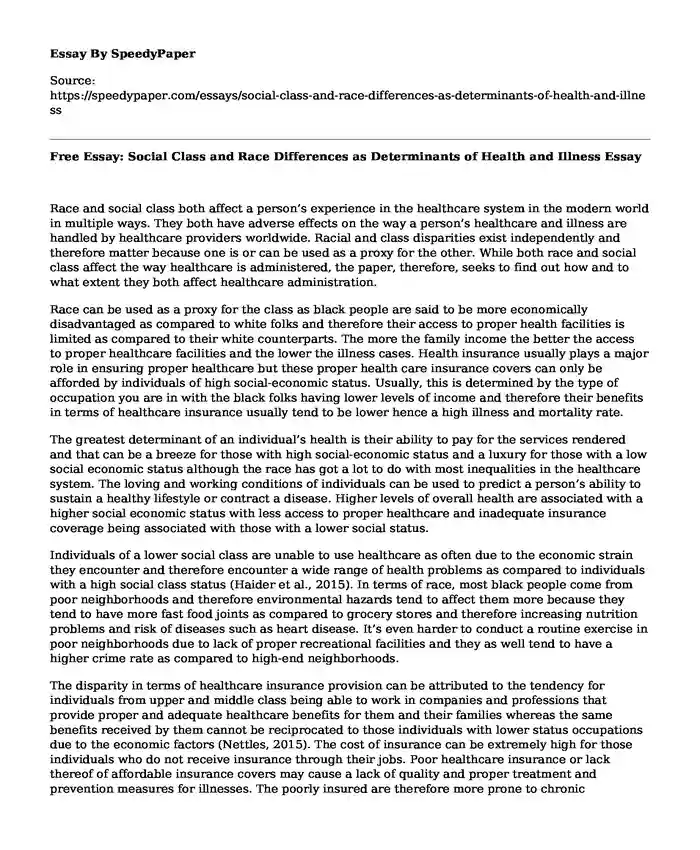
| Essay type: | Analytical essays |
| Categories: | Race Discrimination Community health Social issue |
| Pages: | 3 |
| Wordcount: | 673 words |
Race and social class both affect a person’s experience in the healthcare system in the modern world in multiple ways. They both have adverse effects on the way a person’s healthcare and illness are handled by healthcare providers worldwide. Racial and class disparities exist independently and therefore matter because one is or can be used as a proxy for the other. While both race and social class affect the way healthcare is administered, the paper, therefore, seeks to find out how and to what extent they both affect healthcare administration.
Race can be used as a proxy for the class as black people are said to be more economically disadvantaged as compared to white folks and therefore their access to proper health facilities is limited as compared to their white counterparts. The more the family income the better the access to proper healthcare facilities and the lower the illness cases. Health insurance usually plays a major role in ensuring proper healthcare but these proper health care insurance covers can only be afforded by individuals of high social-economic status. Usually, this is determined by the type of occupation you are in with the black folks having lower levels of income and therefore their benefits in terms of healthcare insurance usually tend to be lower hence a high illness and mortality rate.
The greatest determinant of an individual’s health is their ability to pay for the services rendered and that can be a breeze for those with high social-economic status and a luxury for those with a low social economic status although the race has got a lot to do with most inequalities in the healthcare system. The loving and working conditions of individuals can be used to predict a person’s ability to sustain a healthy lifestyle or contract a disease. Higher levels of overall health are associated with a higher social economic status with less access to proper healthcare and inadequate insurance coverage being associated with those with a lower social status.
Individuals of a lower social class are unable to use healthcare as often due to the economic strain they encounter and therefore encounter a wide range of health problems as compared to individuals with a high social class status (Haider et al., 2015). In terms of race, most black people come from poor neighborhoods and therefore environmental hazards tend to affect them more because they tend to have more fast food joints as compared to grocery stores and therefore increasing nutrition problems and risk of diseases such as heart disease. It’s even harder to conduct a routine exercise in poor neighborhoods due to lack of proper recreational facilities and they as well tend to have a higher crime rate as compared to high-end neighborhoods.
The disparity in terms of healthcare insurance provision can be attributed to the tendency for individuals from upper and middle class being able to work in companies and professions that provide proper and adequate healthcare benefits for them and their families whereas the same benefits received by them cannot be reciprocated to those individuals with lower status occupations due to the economic factors (Nettles, 2015). The cost of insurance can be extremely high for those individuals who do not receive insurance through their jobs. Poor healthcare insurance or lack thereof of affordable insurance covers may cause a lack of quality and proper treatment and prevention measures for illnesses. The poorly insured are therefore more prone to chronic cardiovascular diseases since they are economically unable to cater to their prevention and treatment. A higher social class and economic ability, therefore, play a great role in terms of ensuring proper healthcare is maintained despite the race being the highest factor for inequality in healthcare administration.
References
Haider, A. H., Schneider, E. B., Sriram, N., Dossick, D. S., Scott, V. K., Swoboda, S. M., ... & Lipsett, P. A. (2015). Unconscious race and social class bias among acute care surgical clinicians and clinical treatment decisions. JAMA Surgery, 150(5), 457-464.
Nettels, E. (2015). Language, Race, and Social Class in Howells's America. University Press of Kentucky.
Cite this page
Free Essay: Social Class and Race Differences as Determinants of Health and Illness. (2023, Aug 27). Retrieved from https://speedypaper.com/essays/social-class-and-race-differences-as-determinants-of-health-and-illness
Request Removal
If you are the original author of this essay and no longer wish to have it published on the SpeedyPaper website, please click below to request its removal:
- Free Essay: Comparison and Contrast of Irene Redfield and Clare Kendry in Nella Larsens Passing
- The Moral Obligation of Healthcare - Essay Sample
- Free Essay. the Importance of Health Maintenance, Screening, and Management of Hypertension
- Paper Example. Race, Ethnicity, and Perception
- Free Essay. Death with Dignity and Green Burial
- Various Protein Diets - Free Paper Sample
- Emotional and Physical Stress for Nurses - Essay Sample
Popular categories




